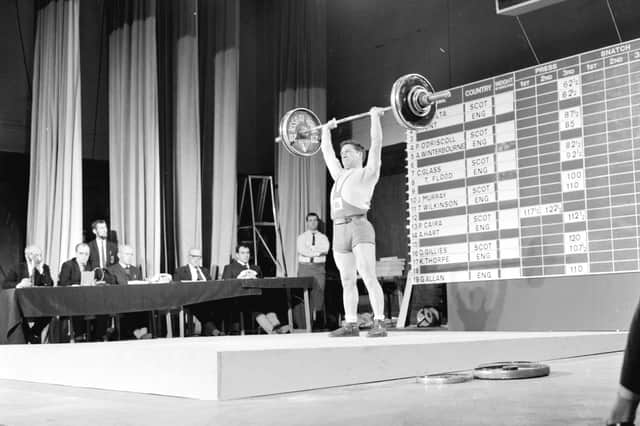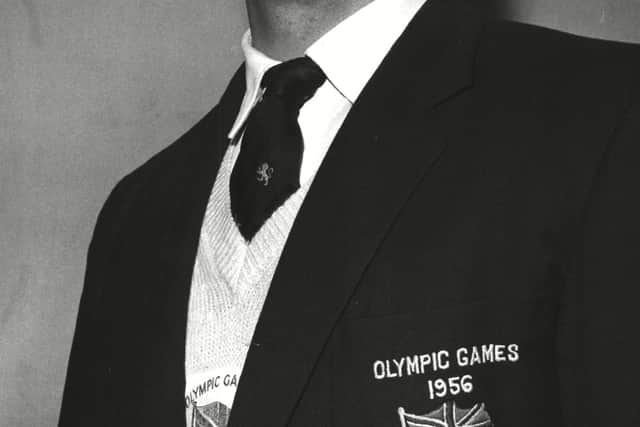Phil Caira: Why it is time decorated weighlifter is inducted into Scottish Sports Hall of Fame


Which makes all the more creditable the late Phil Caira’s feat of winning consecutive gold medals at Commonwealth Games in 1958 and 1962, the first lifter from any competing nation ever to achieve that. Given that his success story was woven in Kirkcaldy and launched in collaboration with a future world class iconic coach from nearby Thornton in Al Murray, almost makes it sound like a work of fiction as weightlifting was hardly the first thing that came to mind in relation to Fife. Adding into the mix his participation at five Commonwealth Games in total including one as Scotland team flag bearer, two Olympic Games, and winning multiple Scottish and British titles while setting countless records, it is clear he was an exceptional Scottish sportsman of the highest rank.
With that CV he would surely have been an ideal candidate for induction into the Scottish Sports Hall of Fame, the body set up in 2002 under the auspices of Sport Scotland to “pay tribute to our iconic sportsmen and women” and “to inspire future generations”. For reasons that remain unclear and puzzling, induction has never happened despite Caira’s son Anthony proposing his inclusion during the build up to Glasgow’s Commonwealth Games in 2014. From his base in Qatar where he is a golf professional he commented: “I thought Dad’s achievements were more than worthy of a place in the Hall of Fame and even supported the proposal with a folder recording the detail of his career including photographs. It’s very disappointing that it’s not taken place but my family and I very much hope he can still be admitted.”
Advertisement
Hide AdAdvertisement
Hide AdHis exclusion is made more perplexing in the context of the two inductees already in the Hall in the weightlifting category, Launceston Elliott and John McNiven.


Without denigrating them, it is worth reflecting that Elliott appears to merit his place principally for his gold medal at the 1896 Athens Olympics for the ‘one handed lift’, an event no longer in vogue. His description as “from the Borders” is slightly misleading as he was born in India and seems to have lived thereafter in England and Australia, although claiming lineage from a Borders family.
McNiven enjoyed an excellent career competing at six Commonwealth Games in which he won two bronze medals and was twice a teammate of Caira. In his opinion, the Fifer is ‘the best lifter Scotland has ever produced,’ begging the question why he does not feature in the Hall.
Caira’s achievements are rendered all the more remarkable considering the adversity and lack of support he had to overcome in order to excel. This was a time when athletes like him were true blue amateurs who combined sport with earning a living, had nothing like Lottery funding or sports science behind them and had to train in the most basic of facilities which often lacked even the amenity of a shower.
As a youngster he attended the Rose Street Boys’ Club in Kirkcaldy where he enjoyed gymnastics and wrestling, leading to his involvement with weights. A wrestling coach John Dick thought young Phil might have potential as a weightlifter and took him aged 15 in 1948 to the ‘Al Murray School of Physical Culture’ in Thornton where Murray recognised his precocious talent and began moulding him into champion material.
The son of Italian immigrant parents born in London who came north to Fife as a seven-year-old after their house was bombed in the Blitz, he was hardly encouraged in his new sport by parents who questioned why he wasted his time lifting weights. Together with coach Murray he set about answering that question in the most convincing fashion.
By the end of the year he won the Scottish Junior title at his first attempt and had become ‘Mr. Britain Jr’ at bodybuilding. In February 1949 he set his first Scottish senior record aged 16 and later that year became the youngest boy in the British Empire ever to lift 300 lbs above his head in the clean and jerk lift. In between times he also won his first Scottish senior title at light heavyweight aged 16.
In 1950 he made history by becoming the youngest winner ever of a British senior weightlifting title, claiming the 13 stone category crown in London aged 17 while still a pupil at Kirkcaldy High School. By now he was being regularly referred to in the press as ‘Scotland’s Wonder Boy’ with one publicity poster for a ‘Physical Culture Display’ proclaiming ‘This boy is now becoming a world sensation’.
Advertisement
Hide AdAdvertisement
Hide AdMurray was an expert coach who became recognised as a world authority on the sport after moving to London in the early 1950’s to open his Fleet Street gym that became a regular haunt for many celebrities. His ‘School’ continued for a while in Kirkcaldy with him coaching Caira by letter with no adverse effect on his progress which appeared unhindered by the spartan facilities in which he had to train. Dampness, dodgy floors, basic equipment and no showers were only some of the hardships endured in his quest for success.
After collecting more Scottish and British titles he competed in his first Commonwealth Games in Vancouver in 1954 finishing a creditable 4th equal leading to selection for the World Championships in Munich in 1955 and a respectable 8th place.
In 1956 he was ‘highly thrilled’ to be chosen to represent Britain in the Olympics in Melbourne at light heavyweight and when asked about his prospects modestly responded, ‘Who knows, I don’t think I’ll do too badly.’ A case of considerable understatement as he powered to an excellent 5th place breaking four British records en route.
A year later in Moscow he won silver at the International Youth Games while in 1958 he won his first gold at Cardiff ‘Empire and Commonwealth Games,’ days after the birth of daughter Laura.
Again he was selected for the Rome Olympics of 1960 where injury adversely affected his performance but in 1962 in Perth, Australia he won his second Commonwealth Games gold despite extreme heat causing him to lose half a stone in bodyweight in the 48 hours preceding competition.
For the 1966 Games in Jamaica he was accorded the honour of being Scotland’s flag bearer at the opening ceremony in Kingston although a technical disqualification ruled him out of a podium place while his final Games appearance was in Edinburgh in 1970 bringing the curtain down on a long title and record laden career.
Widely considered a likeable and modest individual he was also very driven, dedicated and determined in pursuit of improvement, reflected in the meticulous training and performance records he kept throughout his career. Needless to say he was a particularly celebrated figure in Kirkcaldy where his ‘Olympic Café’ next to the Raith Ballroom was a popular haunt as was his newsagent’s business.
The ‘Lang Toon’ thought highly of him, twice honouring him with civic receptions where he was presented with an inscribed gold watch and gold cuff links. At the second of those after his Perth success, Provost Gourlay stated: “Mr Caira has brought great honour not only to Kirkcaldy but also to Scotland, his is a truly wonderful record.”
Advertisement
Hide AdAdvertisement
Hide AdIt is to be hoped that the Scottish Sports Hall of Fame recognise those sentiments and induct Phil Caira to his rightful place.